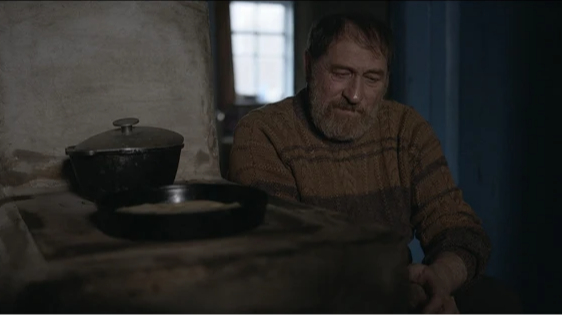“
One of the 447 projects submitted in 2020 to the competition of the State Film Agency of Ukraine, “Grey Bees” definitely included in the cohort of the best. To a large extent, due to the original source – a very clever, funny and masterful novel of the same name Andriy Kurkov. But, to no small extent, and because of Moiseev’s scenario, which is as tangential to the novel as possible, which transferred the main thing from the work, transferred it with caution, but also added his vision, his interpretation of the plot.
Kurkov’s ideological center was Donbas. In Moiseyev, the emphasis is shifted to the ATO, to two elderly men who remained in an abandoned village on the demarcation line, on the border between the Ukrainian military and separatists supported by the Russians.
Aretelerian projectiles fly over their heads. Sometimes they fall next to each other. They cover the windows with boards. But since they are opposites, one does it silently, and the other reacts emotionally, waving his hands and shouting. The first is clearly Ukrainian, the second is more for “those from his side of the village”. The script has all the flavor of their conversations, similar to swings – if not to gunfights. But the script is not a film.
At the time, in 2020, when Moiseyev’s “Grey Bees” justly won State Cinema funding, the director was asked to not spoil the script (a tribute to the writer and fans of the novel), but at the same time, not to spit in the mess of the State Agency.
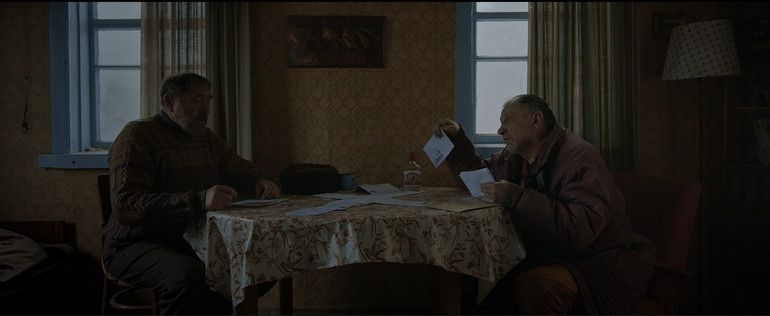 A frame from the movie “Grey Bees”
A frame from the movie “Grey Bees”
Film.UA Distribution
And so the film came out. And somehow it darkened, or rather turned gray… The problem of “Grey Bees” turned out to be not the director’s lack of talent, but lack of courage. Probably, the fear of smearing instead of drawing turned the camera into a numb boy on stage. Despite the assurance to dance live, as was stated in the project at the State Cinema competition.
Planned to shoot with a “moving camera”, the film, on the other hand, froze in a static observation of the characters, as a rule, being in the room. And all the utensils of the heroes’ dilapidated houses, so carefully and lovingly furnished by the production designer Vladlen Odudenkoworks only once, at first glance, when we enter the world of the heroes, see it, and everything is frozen, like in a picture. Or like in the theater.
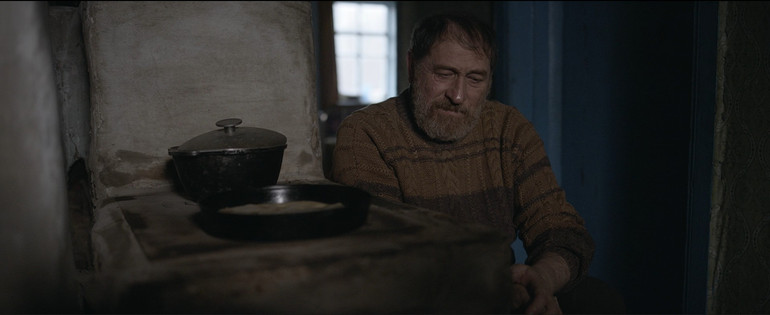 A frame from the movie “Grey Bees”
A frame from the movie “Grey Bees”
Film.UA Distribution
But life cannot be frozen. At least, not for long, because it will not work to stand on one leg for a long time in the “stand still” position. The idea of a moving camera to reflect life: to look over the hero’s shoulder, to move from room to room with him, to be sporty, to see his breath and how his lips stretch to a mug of hot tea, and how his eyes glaze over when he holds a grenade in his hands. But it remained an idea in the papers for an application to State Cinema.
Probably, the concept of filming changed in the process, and the style of “observation” became more balanced, taking into account both the small budget of the film and the director’s lack of experience with such a technique. Although the operator Vadim Ilkov perfectly masters both styles, confirming this with his skilful and documentary films (“Mariupolis”) and feature films (“Volcano”).
Probably, conceptually, it was invented to divide the film in half, leaving the static for the premises, and giving the movement to the actions of the characters on the street. Probably. But not exactly. And the point is not what was left and what was not, because the concept did not work. The film, which was already not funny, became rhythmically sad.
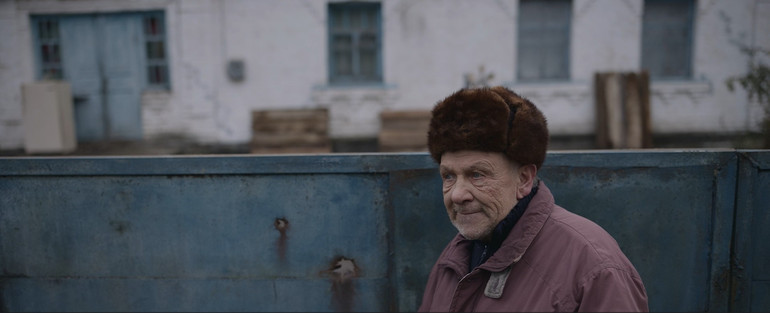 A frame from the film “Grey Bees”
A frame from the film “Grey Bees”
Film.UA Distribution
The entire load of the viewer’s attention shifted to the main characters (two more people will appear in the frame, but in episodes). And here is something to talk about. Viktor Zhdanov (silent) and Volodymyr Yamnenko (speaker), like giant dump trucks, take away the lion’s share of meanings, showing both human and political difference.
Yamnenko is advantageously livelier, and his reactions spill over the edge (the episode when he rummages in someone else’s house and finds black and white erotic photos of the landlady behind the mirror is simply an emotional bomb). Zhdanov is self-absorbed, sometimes showing brightness from solitary thoughts (the episode when he silently, kindly smiles at himself is wonderful).
The characters are different, the actors are charismatic, and the film naturally and expectedly vibrates from their emotional waves, compensating for the stagnant theatricality of the director’s “approach”. But even in strong moments, strong acting and cinematography, the director cannot pull them off. In the penultimate scene, where Zhdanov’s hero sits in the dark, illuminated only by the flashlight of the person who came to him, another action is requested, and the director himself would have to come up with it. Because the cameraman has already invented the dramatic contour lighting of the hero, and Zhdanov speaks his monologue powerfully, quietly and mournfully, as it should be. But everything froze again. It hurts.
Still, the finale cures the “disruption” from high expectations. Moiseev reworked it – we see not what was in Kurkov’s novel, and not what Moiseev “promised” in his script, accepted by Derzhkino. And he did it well.
The finale of “Grey Bees” poses a difficult question mark, giving space for reflection – what to do? What to do when you live next to the Russians, these eternal savages hiding behind the screen of “great culture”? What to do with yourself, realizing your old age and frailty? Is it worth living like this? Is it worth living with “them”? Them? In general? The viewer is left to answer for himself. And this at the last moment makes the film untalented, giving perspective.
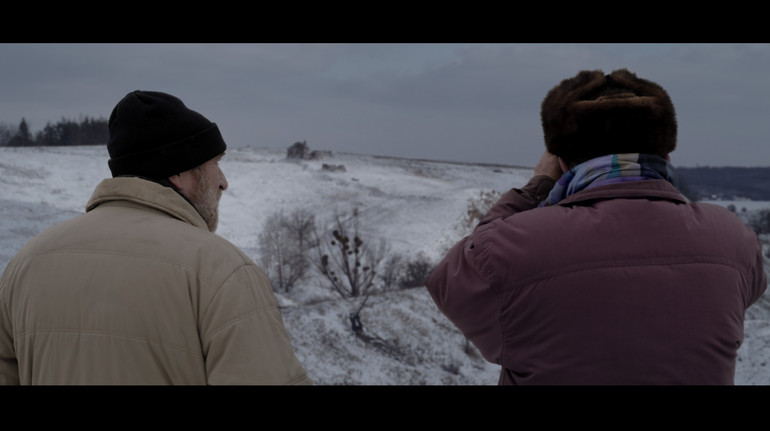 A frame from the movie “Grey Bees”
A frame from the movie “Grey Bees”
Film.UA Distribution
”, — write: www.pravda.com.ua
One of the 447 projects submitted in 2020 to the competition of the State Film Agency of Ukraine, “Grey Bees” definitely included in the cohort of the best. To a large extent, due to the original source – a very clever, funny and masterful novel of the same name Andriy Kurkov. But, to no small extent, and because of Moiseev’s scenario, which is as tangential to the novel as possible, which transferred the main thing from the work, transferred it with caution, but also added his vision, his interpretation of the plot.
Kurkov’s ideological center was Donbas. In Moiseyev, the emphasis is shifted to the ATO, to two elderly men who remained in an abandoned village on the demarcation line, on the border between the Ukrainian military and separatists supported by the Russians.
Aretelerian projectiles fly over their heads. Sometimes they fall next to each other. They cover the windows with boards. But since they are opposites, one does it silently, and the other reacts emotionally, waving his hands and shouting. The first is clearly Ukrainian, the second is more for “those from his side of the village”. The script has all the flavor of their conversations, similar to swings – if not to gunfights. But the script is not a film.
At the time, in 2020, when Moiseyev’s “Grey Bees” justly won State Cinema funding, the director was asked to not spoil the script (a tribute to the writer and fans of the novel), but at the same time, not to spit in the mess of the State Agency.
 A frame from the movie “Grey Bees”
A frame from the movie “Grey Bees”
Film.UA Distribution
And so the film came out. And somehow it darkened, or rather turned gray… The problem of “Grey Bees” turned out to be not the director’s lack of talent, but lack of courage. Probably, the fear of smearing instead of drawing turned the camera into a numb boy on stage. Despite the assurance to dance live, as was stated in the project at the State Cinema competition.
Planned to shoot with a “moving camera”, the film, on the other hand, froze in a static observation of the characters, as a rule, being in the room. And all the utensils of the heroes’ dilapidated houses, so carefully and lovingly furnished by the production designer Vladlen Odudenkoworks only once, at first glance, when we enter the world of the heroes, see it, and everything is frozen, like in a picture. Or like in the theater.
 A frame from the movie “Grey Bees”
A frame from the movie “Grey Bees”
Film.UA Distribution
But life cannot be frozen. At least, not for long, because it will not work to stand on one leg for a long time in the “stand still” position. The idea of a moving camera to reflect life: to look over the hero’s shoulder, to move from room to room with him, to be sporty, to see his breath and how his lips stretch to a mug of hot tea, and how his eyes glaze over when he holds a grenade in his hands. But it remained an idea in the papers for an application to State Cinema.
Probably, the concept of filming changed in the process, and the style of “observation” became more balanced, taking into account both the small budget of the film and the director’s lack of experience with such a technique. Although the operator Vadim Ilkov perfectly masters both styles, confirming this with his skilful and documentary films (“Mariupolis”) and feature films (“Volcano”).
Probably, conceptually, it was invented to divide the film in half, leaving the static for the premises, and giving the movement to the actions of the characters on the street. Probably. But not exactly. And the point is not what was left and what was not, because the concept did not work. The film, which was already not funny, became rhythmically sad.
 A frame from the film “Grey Bees”
A frame from the film “Grey Bees”
Film.UA Distribution
The entire load of the viewer’s attention shifted to the main characters (two more people will appear in the frame, but in episodes). And here is something to talk about. Viktor Zhdanov (silent) and Volodymyr Yamnenko (speaker), like giant dump trucks, take away the lion’s share of meanings, showing both human and political difference.
Yamnenko is advantageously livelier, and his reactions spill over the edge (the episode when he rummages in someone else’s house and finds black and white erotic photos of the landlady behind the mirror is simply an emotional bomb). Zhdanov is self-absorbed, sometimes showing brightness from solitary thoughts (the episode when he silently, kindly smiles at himself is wonderful).
The characters are different, the actors are charismatic, and the film naturally and expectedly vibrates from their emotional waves, compensating for the stagnant theatricality of the director’s “approach”. But even in strong moments, strong acting and cinematography, the director cannot pull them off. In the penultimate scene, where Zhdanov’s hero sits in the dark, illuminated only by the flashlight of the person who came to him, another action is requested, and the director himself would have to come up with it. Because the cameraman has already invented the dramatic contour lighting of the hero, and Zhdanov speaks his monologue powerfully, quietly and mournfully, as it should be. But everything froze again. It hurts.
Still, the finale cures the “disruption” from high expectations. Moiseev reworked it – we see not what was in Kurkov’s novel, and not what Moiseev “promised” in his script, accepted by Derzhkino. And he did it well.
The finale of “Grey Bees” poses a difficult question mark, giving space for reflection – what to do? What to do when you live next to the Russians, these eternal savages hiding behind the screen of “great culture”? What to do with yourself, realizing your old age and frailty? Is it worth living like this? Is it worth living with “them”? Them? In general? The viewer is left to answer for himself. And this at the last moment makes the film untalented, giving perspective.
 A frame from the movie “Grey Bees”
A frame from the movie “Grey Bees”
Film.UA Distribution
